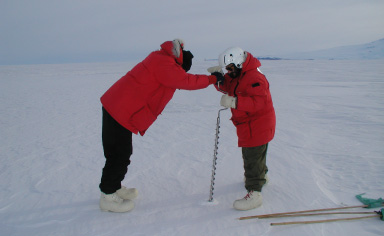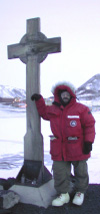The Arctic is ocean surrounded by land, whereas Antarctica is a continent surrounded by water.
They both provide plenty of challenges for researchers like Dr. Michael Castellini. Much of his
field work has taken place in high latitudes. He has been to the Arctic countless times and made
15 expeditions to Antarctica, one lasting for an entire calendar year. His lab holds the
unofficial record for sending a student from pole to pole in the shortest amount of time - six
weeks. And he's had a student shipwrecked in the Aleutians.
Working in high latitudes means dealing with very few humans, a small amount of infrastructure, ice, and
cold. As technology has improved, some of these challenges have been mitigated. The capabilities of remote
satellite sensing - drifters and gliders and Autonomous Underwater Vehicles (AUVs) – means being able to
gather data from areas that are remote and dangerous. But there is still a need to do field work.
In the Arctic, where marine mammals have been hunted for thousands of years, getting close to an animal is a
challenge. Not so in more remote Antarctica. "In Antarctica, you can walk up on the ice and pick up a pup
and there'll be no interaction," says Mike. In Antarctica, where the ice can be 6 feet thick, Mike's team
would drill a hole in the ice that would encourage marine mammals to appear in order to breathe, thus
creating a custom-made testing site.
"You have to go to the marine mammals - and that means the Arctic and Antarctica." |
As climate change is changing the ecosystems of the Arctic, geopolitical issues are becoming more of an
issue for researchers. Recently, a UAF faculty member was arrested by the KGB while doing field work on
a small island between Alaska and Siberia. The Northwest Passage is opening up, there are treaty issues,
military and mining disputes. And this means changes for UAF. "Now we have policy, legal and economics
experts on the SFOS faculty," says Mike. New challenges await in the high latitudes.



